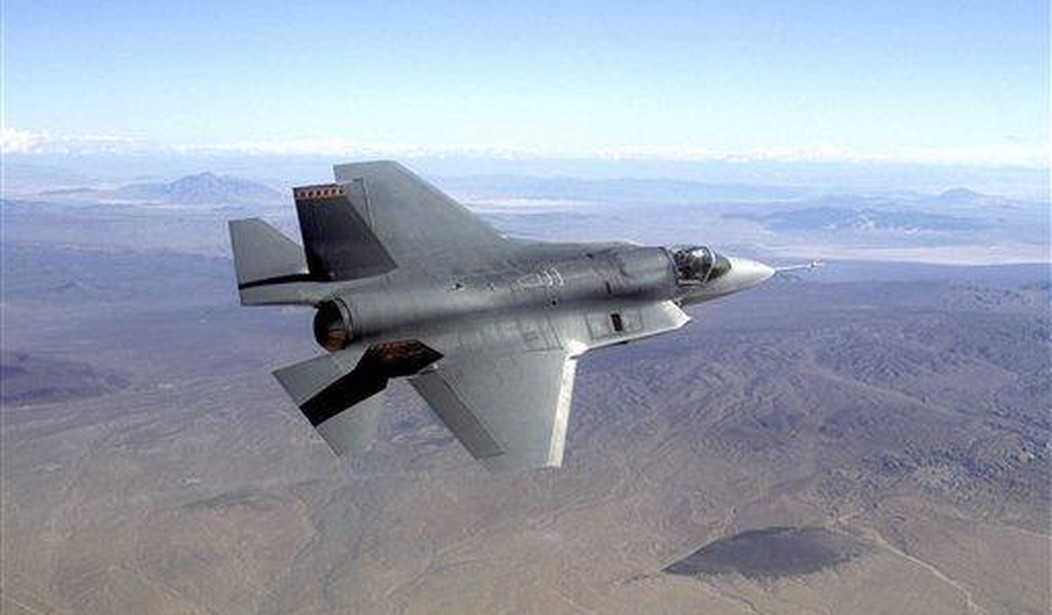In 2014’s "Captain America: Winter Soldier," Cap tells us, “The price of freedom is high.” He had no idea how right he was.
With a price tag of $400 billion, the F-35 fighter is the costliest weapons program on Earth. Billed as the future “quarterback” of America’s air fleet, the F-35 is a “fifth-generation” fighter jet – a term most people first heard in last year’s Top Gun: Maverick – which means it can fly undetected by radar, at speeds of roughly 1,200 MPH, with a nuclear payload. If it’s at peak performance, the F-35 fleet could win World War III in about half an hour.
The key word, however, is “if.”
In mid-December, a brand, new F-35B crashed on a Fort Worth runway while its pilot was taking it for a test flight. As video here shows, the craft bounced and tipped forward because of presumed engine problems, so the Pentagon has canceled deliveries until it can figure out what went wrong.
The pilot wasn’t hurt, thank goodness, but we can’t say the same for the reputation of Pratt & Whitney, a subsidiary of Raytheon Technologies.
This isn’t the first time something has gone wrong here, indeed Raytheon’s contribution to the F-35 has a longstanding history of problems.
Last year amidst “struggles with parts and labor shortages,” Raytheon Technologies Corp missed delivery requirements to its Pratt & Whitney. In 2021, Citizens Against Government Waste wrote in The Hill that the “F-35 may be unsalvageable,” citing design flaws, excessive cost, and undue red tape – this was an “I told you so” by CAGW after the F35 had missed a deadline the previous year.
In 2017, the Pentagon blamed Pratt & Whitney for problems with the F-35, citing unnecessarily high engine prices – to the tune of $43 million – and unresponsiveness to cost-cutting initiatives. Though that $43 million seems quaint by comparison to the when the engine cost shot up $2.5 billion more than the originally projected $4.8 billion, as the Navy reported in 2010. Incidentally, it’s also Lockheed Martin's biggest money-maker
Recommended
Now keep in mind these figures are for the entire program, not a single craft. The whole program was budgeted at $400 billion, according to a 2019 report by IBD, with a per-unit price tag of about $89 million. But even by Washington standards, this program is expensive.
None of this is to say that military spending is horrible or the defense industry is evil. Even when we use the phrase “military industrial complex,” we must remember that extra-governmental support has always been a key component of our country’s defense. Moreover, the reason the Pentagon outsources technical support to the private sector is to reap the benefit of private-sector ingenuity and competition. If we unlock the potential of the free market, we will always outperform dictator states.
The key word, however, is “if.”
Beijing is flying spy balloons over the US mainland, stealing our technology, buzzing Taiwanese airspace, conducting drills with Russia, building a navy in space, and who knows what else. We can only hope that China is having similar problems with getting its own fifth-gen fleet into the wild blue yonder and we just haven’t heard about it.
But we do know they aren’t wasting energy rewriting their military songs to be more “sensitive” – they’re ramping up their military power to rewrite history.
We all hope that the world is big enough for two world powers, but we have to plan that it isn’t. In any conflict in the South China Sea, US military pilots will have a huge numbers disadvantage because they’ll be separated from their main force by the Pacific Ocean, whereas the Chinese won’t be. So long-range fighters with functional engines are a very high priority indeed.
America must maintain air superiority, but we need to do it smarter than we are. The F-15EX seems like the better choice for winning the fifth-gen race rather than throwing (yet) more billions down the F-35 money pit. President Reagan won the Cold War by outspending the Soviets; at this point, we’ll lose to the Chinese by outspending ourselves.
Again, the price of freedom is high, but the price of losing to communist China is incalculable.

























Join the conversation as a VIP Member